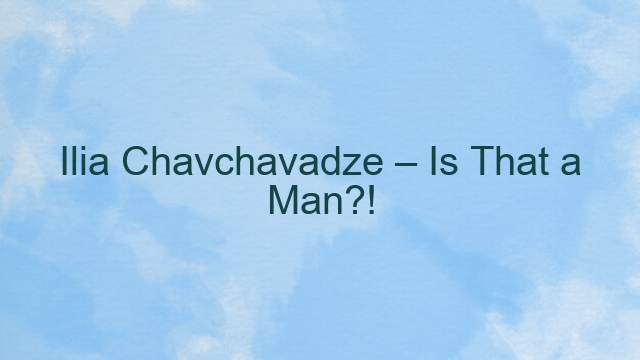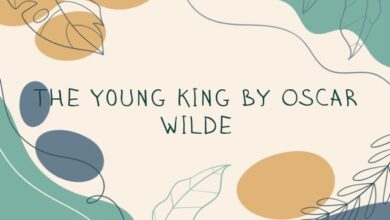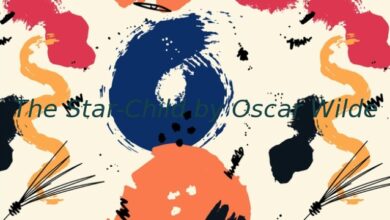
Ilia Chavchavadze – Is That a Man?!
“Blame a friend to his face, an enemy behind his back”
Wise Saw
In Rhetoric it is written: A man should begin everything with an introduction. This is true, Let us so begin.
Whoever recognizes himself in the image of Luarsab, whoever applies to himself what is written of Luarsab willof course begin to throw mud and call the simple author of this story a “fool”. Let them be well assured that we have naught to do with individuals, we write of a general evil.
For the rest, I find courage in the truth of these words: “Blame a friend to his face, an enemy behind his back”. Where now art thou that first spoke these wise words? I know where thou art: thou art in the people, unseen, and of the people.
I know too what thou art called, thy name is the genius of the people. And I know thy nature: thou art infallible and always right. Thou and only thou givest to him whose heart is sore for “others”. Thou doest this even when those “others” hold sympathy with their sorrows to be a sin. What are we to do? Some show .their sympathy by praising what is evil in a friend and some by blaming the evil. Of these two kinds of people the reader will himself perceive which has the greatest and truest sympathy and love.
I
Prince Thathkaridze’s abode was a fine sight. Imagine to yourself in the midst of Kakhethi in a little village, a bare, low-lying spot and in the very heart of it a two-story stone house. And after this manner were the stories: below was a wine cellar roofed with dry branches of vine and behind this cellar against the wall a little room with a balustrade.
On the balustrade, like a swallow’s nest, there, was fixed up a narrow plank which played the part of a bed. A little way off stood a fireplace also of planks, on this side of it a shed upon which was placed a lop-sided grain-basket, a miserable, forlorn-looking object. There was a little garden too, fenced round. By the fence could be seen, near a leafytree, an old straw shed, bent and twisted on to its side by the vicissitudes of time. It was as if it would fain have lain down in the shade, but like an old woman suddenly stricken by an attack of rheumatism, it was stopped, all crooked and surly. The courtyard of this castellated mansion was fairly extensive. It was engirt by an old paling which had been broken in more than one place and it had never come into the present owner’s head to mend it. Evidently he is a Georgian!
The fence was terminated at one end by huge red gates, of which one side perhaps for two years, — had been pursuing with a terrible frown a post, as if it would seize it and beat it, while the post bent still farther over as if to slip away. Beyond the red gate was a large barn. The straw of it was lying spread like a hillock on the southern side of the whole barn, so that the end of it lay on the chaff-place. The chaff-place was ludicrous, so idiotically meditative and raised on the one side, looking like nothing so much as a broken-winged goose.
In my early childhood I have seen many a fine sight on this straw: here often disported themselves, grunting from excess of sentiment, tender pigs, many a time with their soft snouts they burrowed in the fragrant straw, so energetically, with such delicacy as only pigs are capable of. Then their fondling! Their caresses! Oh, these are indescribable. However contented, these pigs treated each other to the snout. What yelling and squealing used to begin then! Thus does our peasant frequently bestow upon his newly made bride a blow of his fist as a sign of affection. Somebody has said: “Georgian love is an injury”, and I say: a blow is after all, a kind of caress. In administrative matters this has yet another significance; there a blow is a means of instruction. That is not our affair.
The inside of the courtyard was as filthy as an old chinovnik’s (official’s) heart. It was a serious undertaking to reach the master of the house without dirtying yourself or without being saluted by some unsavoury fragrance. This is the outside, — now, readers, we invite you to enter the house of Prince T’hat’hkaridze.
But we must warn you that if we go in we must be careful. The floor is of brick. That is nothing. This is the difficulty that here and there the bricks have been pulled up and in their place remain hollowed out holes. You must keep your eyes very wide open, for if your foot slips in, woe to your enemy! A man might break his neck or else his leg. It is true indeed the host will make many apologies, but an excuse doesn’t easily mend a broken neck nor is it the best remedy for a fractured limb. A man might avoid this disaster if the room were light. But alas! it is not even this. Although it has two windows, pretty small even for loopholes, still the room is dark, because on the pine window frames instead of glass some very active mind had fixed oiled paper. There is a proverb applicable to this sort of thing: “Cunning is better than force, if a man is ingenious”. In ingenuity the cleverest European chatterer cannot excel a Georgian.
Many a time elsewhere have I seen such windows with ludicrous ornaments. Many a time have I seen the oiled paper on such a window pricked with patterns with a needle: sometimes a heart is portrayed, sometimes a cross: and again sometimes something like the following is is written: “How did the bear go up the tree, lullaby, lullaby!”!
This of course must be a woman’s work. And if it were indeed, what harm is there in it? Weary of reading her Psalter, with some sorrow on her heart, seated at the window to distract her mind and pass a wearisome day she may have taken her breast-pin and set her hand to this really entertaining work. She was idle and she acted in accordance with the proverb: “Useless work is better than useless sitting”.
In T’hat’hkaridze’s room there were two long divans opposite each other. So clean were the felt and carpets spread upon them, that when the Princess rose up, on every serene stop of the serene foot of her serene highness the clouds of dust rose so prettily that the beholder could not gaze enough. Between the two divans on the eastern wall was seen a besmoked, from the inside and from the outside, sad, mournful fireplace, like the open mouth of a toothless old woman. Here and there as adornments to the room were scattered various objects, such as: a muddy pair of white Qarabagh riding boots, a broken-mouthed copper jug, a greasy candlestick, dried herbs boiled in a copper teapot, a piece of the back of a dried fish, etc, etc.
II
Think not, readers, that this house belonged to some poor man and that therefore it was so pitiably neglected — no, he is the master of twenty men with well-built houses so that he is able to man as many as ten carts for agricultural purposes, sheep in abundance and about a hundred horses which are of no less value to an enlightened owner than so many slaves. So much for the live stock: now let us count up the property: two well grown vineyards and land enough for a hundred and fifty days ploughing and sowing. These possessions serfs, houses and land in the hands of one who knows how to make the best of it are a choice morsel.
Then why does it stand in such ill condition, asks the astonished reader. Because he is a Georgian, we reply, fully convinced that we have given a good reason.
Yes, in that beautiful home dwells a Georgian, free from care, Prince Luarsab T’hat’hkaridze, a man of forty, with his inseparable spouse, Princess Darejan.
Prince Luarsab T’hat’hkaridze was a well-nourished Georgian of the olden time, as round — I make no apology for the simile — as a well fatted calf. His Highness had the appearance of a gentleman: a head so big that it seemed as if by its weight his thick neck was fixed in his shoulders like a nave in a wheel; his poppy cheeks were ruddy as Thurashian apples, a soft chin with triple fold, apt to kindle love great big eyes, always bloodshot as if he had a rope tied round his neck; a swelled, very considerably protruding, highly respected and respectable paunch, inert, fat, hairy hands, squat, big feet-here you have a general and particular description of Prince Luarsab’s “heaven-breathed soul’s” worthy covering. This heaven-breathed soul was nowhere visible, as if it had been choked through being buried in His Highness’s fat. A Georgian should be careful of breathing in or letting out wind. May not our prince have let this “heaven-breathed” soul escape in wind?
Of learning, by the grace of God, he had none at all. If he had he would not have been so fat. It often happens that when the soul languishes the flesh makes holiday, when the soul blooms the flesh fades. This is why, they say, that consumptives are wise. I do not think, it ever struck our Luarsab to ask why he had no education, — just for that reason:
“It is the plague of the present day”, he used to say sorrowfully, just as if the country was suffering from this plague.
His Highness was right too: in his opinion man was a bottomless jar into which all day there should be poured provender and drink, but it could never be filled. His Highness saw in himself, with his serene wisdom, that an untutored man could fulfil this function perfectly well, all the more if he is lord of herds and serfs, serfs who do not differ much from the herds.
“Times have changed” Luarsab used to say with a groan, “times have changed.”. Since these infernal schools have been introduced, Sir, the virtue has gone forth from the Georgian. No colour is left in our children. As for eating, they do not know how to eat, and as for drinking they can’t drink. What sort of men are they?! They understand books? Though I don’t know anything about books am I not a man, haven’t I a hat on my head! (*1) I don’t lack flesh and colour. Books are not a trade for men, — that’s women’s work. Give me back the good old days ! Then everything was done in the proper way, everything was in its own place… A good horse, a good gun, a strong arm, and a man was respected then” Ah! my Luarsab! I know thou art sincere, like every old-fashioned Georgian, but thou art wrong in longing for the olden times. Dost thou not know who was desirable in the old days? Are there not horses now? Does not the gun hit the mark nowadays? Are there few strong arms? We still have all these things, but we lack that heart, that ardour, that patriotic devotion which was wont to use a good horse and a good gun in a good cause. The men of by-gone times gave beauty to horse and gun, but now it is the horse and gun that adorn the man. The olden days were good, but the poet Besarion Gabashvili was not wrong when he said. “One ‘I have’ is better than a thousand ‘I hads?'”, — we will say this and bite our tongues, lest…
Though Luarsab lamented so much the plague of the present day, still his face always wore a smile of imbecility peculiar to him. There is a saying: “If you yoke one ox to another it will change either its colour or its temper”. I never saw this proverb so justified as in Prince Luarsab’s house. His dear consort, Princess Darejan was indeed her husband’s other self and they were “One soul and one flesh” as it says in Holy Writ. But how? The same rotundity, the same corpulency, the same smiling face and almost the same stupidity. These two tender wood pigeons, one in soul and flesh, lived wondrous pleasantly together, far from the vapid turmoil of the world. At cockcrow the happy couple opened their eyes: Darejan immediately flew out of the nest while Luarsab, the selfish Luarsab, often indulged himself. With the coverlet thrown back from his chest to turned on the other side with a snore, a groan and other noises of the kind. It happened even that he passed the dull time until dinner in this luxurious manner.
The Georgians say: “He who has plenty of hair on his body is lucky” If this be true, then beasts should be happy! If it be false why should so many of us try to act like beasts? Because if beasts are happy they are only happy because they are hairy.
What can we say about Luarsab’s body? As for his chest it was covered with bristles like a pig, so that many doubtful creatures were able in times of alarm to find shelter there, but “… but what? Was not Luarsab happy? As many healths had been drunk in his honour as a Prince of his standing could desire. The hair on his body alone was enough to rouse the envy of an unfortunate man, apart from anything else. What indeed troubled Luarsab? Did he lack colour or flesh? When did he, like any other simple man, allow thought or care to rob him of sleep or of appetite? He had a good colour, the best of flesh, enough of drink, food and sleep. What more is needed by a Georgian who considers that good and bad luck depend upon hair, and for him, if it be his lot, happiness consists in fanning away flies with his hat all his days.
Reader, are you not weary? Of course you are: here there is no love intrigue, no murder, no wailing of hopeless maids, no leaping into the water, in a word nothing that adorns the story written to amuse, here there is nothing of this kind. Then you must be weary, of course. But you ought to know this, reader, that I have not written down this simple story to amuse you. I want this story to make the reader think, and if it wearies him it is because thinking and boredom are inseparable brother and sister. I want the reader to be wearied, not because it is not amusing but because he is made to think. If this simple work can succeed in doing this I want nothing more, nor did I desire more, my weary reader! If I cannot contrive to do this, what’s to be done? I can console myself with this that idle work is better than idle “sitting” How many a useless man has become useful by this blessed proverb. I too perhaps…
When Luarsab was in the state of bliss above described it was death if anybody interrupted his enjoyment and luxury, that is, turning over and over in a gentlemanly and honourable manner on the divan. He was angry if a guest came, said silly people, but surely this was not because he was mean? I wonder that you should think such a thing! Can meanness and a Georgian be found together? Do not frost and fire destroy each other? If he disliked visitors it was only because he had to get up and dress. Getting up even was nothing, this had no terrors for Luarsab: but it was dressing that was the death of him. He passed the whole summer without letting anything come near his body except his shirt and its companion garment, if he was left to his own devices; if not, everything additional was a burden to him. In winter he put a fur coat over his shirt, unless any important personage was invited, for instance the district judge. At the time of which I write the judge was a big bogey: nowadays, since that weary learning has come in, the judge is not looked upon as anybody in particular, but formerly ugh! ugh! What a great man he was. He was such a big man that a proverb was made about his entertainment by the lesser nobility: “Don’t think it a joke to have a judge for your guest”. That entertaining a judge is no joke every peasant even knows very well nowadays, and formerly the princes knew it too.
Darejan was not as lazy as Luarsab; in this respect, ‘fore God; they were certainly not alike; it turned out that they had the same colour but not the same character. Whenever the princess opened her eyes wide she flew out from the divan like a falcon, fastened her petticoat, tied a kerchief round her neck, put on a chintz ‘gown — sometimes in her haste, wrong side, first — thrust her bare feet into slippers, and, with a “Now boy!” went down to the strawhouse where the servants reigned, that is in misery and only to a certain extent, and brooded wrathfully over their pent-up feelings. This useless pottering about on the part of our princess was wonderful and ludicrous. This fat, dumpy woman often stood on her feet from morning till noon and rolled about like a ball. She was not as idle as she seemed: here she poked with her elbow a bleary-eyed girl dozing over her sewing, here she slapped the head of a smoky, ragged little urchin, who yawning and lazily, was cleaning for the evening the greasy candle-sticks of the night before; here she scolded one — for what? The princess herself hardly knew why; there she abused another — why? The princess did not know this either; she cursed, swore, raged; in a word, she poured forth on her subordinates all the pent-up wrath of the night and then, weary and exhausted, went into the house; if she met the maid she could not resist giving her another nudge, with a supplementary “May a thunderbolt strike you”, if she was in a good humour — and thus worn out she rolled into the room, where sometimes the bloated prince had rolled over like a wine-skin and if it was summer, counted the flies on the ceiling. On one noteworthy occasion he expressed an opinion and they started a discussion, This was in the middle of the hottest time in summer, before dinner, when Darejan had just finished a journey of the above description and came back into the room with a throbbing in her head and wet with sweat. Luarsab looked round, and seeing that the sweat flowed in beads over her ruddy cheeks said to himself with satisfaction: she is a fair tower of strength in the household, she is a fine woman! I thank thee, my Creator, that thou hast vouchsafed me such an one.
When he had said this, content with his unclouded lot, the prince pleased with God and man, turned over on the other side. This turning over and over was a sign that Luarsab was pleased at something.
“Where have you been, my dear, that you are so tired?” he then enquired of the princess.
“How can you ask me where, my dear? if you have a house, a household, a yard, you must keep a sharp look-out, may your troubles light on my head!” replied the princess.
“Just so, my Darejan, just so, I honour you for it! it is woman’s work.
“Well!” replied his consort, self-satisfied with his praise: “You must keep your eyes wide open with servants or they will do nothing but eat. Young people want looking after.”
“Of course, of course!” “Many a woman does not know how to attend to her business”.
“No, they don’t know, if they did it would be a good thing, so it would!”
“Sometimes you must rage at them without a cause. If you abuse them it won’t do them any harm. Now see how I abuse them, how angry I get, how I rage and curse, and all for what? So that they may fear and respect me, otherwise! …”
“Of course, of course, otherwise! …”
“That’s what peasants are like; like a stubborn ass, if you once give it its head, then, even if you hold a bunch of berries before its nose you cannot make it budge a foot if you don’t rage at it”.
“Of course you must roar at it,” replied Luarsab, again enchanted at his wife’s wisdom: “of course, they are like stubborn asses”. “I am right, am I not?” “Of course you are right, quite right. Even the dream of a woman would be true,” chattered Luarsab inconsequentially. He himself did not know why he had dragged dreams into the conversation.
They were both silent. Luarsab fixed his eyes on the ceiling, where swarms of flies were sitting. Darejan began knitting a sock.
In a short time Luarsab called out:
“I say”, Darejan, of you are a clever woman, guess how many flies there are on that beam?”
“Where?”
“There, on that beam of the ceiling.”
Now don’t say that while they had been silent that ridiculous Luarsab had been counting the flies. How should Darejan know.
“How many are there?” said Darejan, “tell me, then I’ll count them”.
“I could find out that way. But guess, that is where the sport comes in”.
“Is that how I am to do it? Very well, I say there are thirty.”
“Oh! Ho! Ho! You, you can’t guess.
“Well, how many are there?”
“How many? shall I tell you? No, I won’t”.
“Tell me if you know.”
“As I am a man, there must be forty, Oh ! Ho! Ho! you … I have guessed.
“Yes, you have guessed… you counted, as you did the other day; I could guess like that too”.
“God bless you! may my good father be damned if I counted.”
“Then how do yo know there are forty?”
“How? because I am intelligent”.
“But am I not intelligent too?”
“Yes, but how can a woman’s intelligence come up to a man’s? I saw by looking carefully that there were forty”.
“But if there are not forty?”
“I’ll bet you there are”.
“Then let us count them”.
The pair began to count the flies. It turned out that there were more than fifty.
“So you guessed?!” said Darejan reprovingly: “yes, you guessed. My lord has intelligence and that’s why he guessed”.
Luarsab was ashamed and became somewhat confused.
“They had flown away, there were forty,” said the stupid fellow to justify himself; “of course they had flown away”.
“All the better if they had flown away, wouldn’t there have been fewer left? There are more than fifty there now”.
Luarsab grew angry and said to himself: “Why did I chatter like that”.
When he found himself entangled in his own net, grinding his teeth, at which the princess laughed aloud, he said:
“God damn! I am not such a child! I counted them four times”
“But you said you hadn’t counted them”.
“I wonder to hear you say so! If I had not counted them, I should have been another Solomon the Wise if I had guessed. Of course I counted them, God damn! I made a mistake or else I should have won, my soul’s delight! By my life and by God, I should have won.”
Thus spoke the deceitful Luarsab, and became sweet as sugar to his consort who had won on this occasion.
“And so you didn’t count them, you imp, you?” repeated the princess with a smile.
“I have acknowledged it, my dear, what more do you want?”
“Your long life and happiness, my pet! what more should I want”.
“Darejan!”… said Luarsab in an aggrieved and bashful tone; “Darejan, if you love me, don’t call me pet.”
“Why, my dear, why?”
“It doesn’t befit a man like me, let me tell you with all due respect: people call little lap dogs “pet”, it’s a dog’s name, but what sort of name is it to apply to a man?”
“But aren’t you my little doggie? Aren’t you? This is the first time I have heard you say so,” replied Darejan sobbing, for she considered that if he objected to be called her little dog he must have ceased to love.
Luarsab perceived that he had grieved her, and all to no purpose,—and in order to dissipate the idea of his ceasing to love her, he said grinning his teeth:
“Oh! I give in! Oh! I am your little doggie, of course I am! What an eloquent woman she is!” said Luarsab to himself. How prettily and poetically she spoke about my being a little dog! What a mastery of language !… How could she think of it?!”
He too wanted to invent some endearing epithet, but while he was trying to think of one there swam before his eyes visions of stock fish, middle cut of sturgeon, leg of mutton with garlic and such things. With these objects in view what caressing epithet could a man think of?
Nevertheless Luarsab contrived to utter eloquent words:
“Do you know what you are to me? Cress of my soul, tarragon of my heart and my mind’s — what shall I say? Let’s say salt. Haven’t I spoken well, if I have not may your good and renowned father be damned! Weren’t they pretty epithets?”
Chattering thus Luarsab enchanted by his own eloquence gnashed his teeth as a sign of joy. Nor was Darejan unhappy. Often did our couple pass the time in this way. Would that they, O reader!
III
Luarsab well knew how to “terrorize” the servants, as he himself would say. It is true he was inclined to be lazy, but after all did not such a large estate need supervision? The cares of this estate drove him to spring from his couch. Then you should have seen what a fair sight our Luarsab was barefooted, with a blue sheepskin hat upon his head, in a red shirt, with his inseparable companion.
(*1) In Georgian a male is a “hat wearer”, a female a “mantilla wearer”.
Ilia Chavchavadze
Works
Translated by Marjory and Oliver Wardrops
Ganatleba Publishers
Tbilisi 1987Search …





